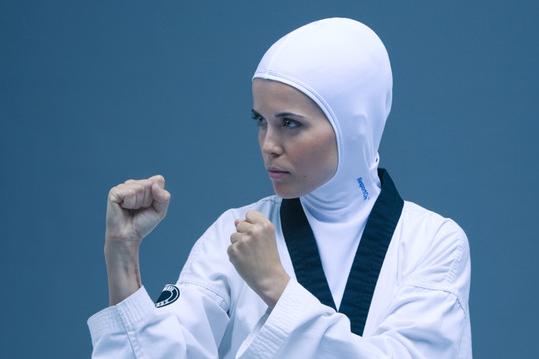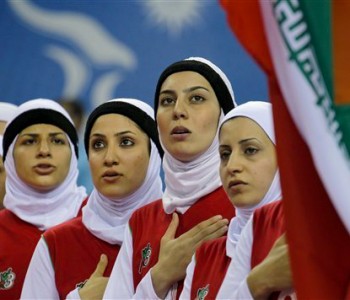Dubai: The name Zahra Lari may not ring a bell offhand, but what she has achieved has surely ensured her a place in the annals of UAE sporting history. The 17-year-old Emirati became the first ever figure skater from the UAE to compete in an international competition when she took part in the European Cup in Canazei, Italy this week.
MALAYSIA WMN
MALAYSIA MUSLIM WOMEN SPOR DOCUMENTS
MUSLIM WOMEN WORLD SPOR DOCUMENTS

MUSLIM WOMEN WORLD SPOR DOCUMENTS
MALAYSIA MUSLIM WOMEN SPOR GIRL
http://rw-3.com/wp-content/uploads//muslim-advertisement.jpg

MALAYSIA MUSLIM GIRL - KUNGFU SPOR GIRL
http://www.theborneopost.com/2012/12/13/arifah-eyes-gold-sweep13-year-old-hopes-to-win-all-eight-events-at-state-wushu-meet/
http://muslimvillage.com/2012/02/14/19601/hijab-no-barrier-for-muslim-athletes-to-excel/
DOHA – Veiled female athletes in the Middle East are overcoming different challenges to excel in various sports fields and shatter western stereotypes about their hijab, culture and religion, a recent research at Northwestern University in Qatar has revealed.
“Female athletes in the Middle East face pressures that include family, religion, politics, and culture,” said the research cited by Trade Arabia website.
“These issues often take place over use or nonuse of the hijab, the traditional head covering for Muslim women.”
The research, “Muslim Female Athletes and the Hijab”, is the result of a year-long cooperation between Northwestern sociologist Geoff Harkness and his course student Samira Islam.
It found that veiled Muslim athletes managed to excel in sports fields, overcoming a unique set of challenges with regard to the ‘hijab’ which is not faced by their Western counterparts.
Based on interviews with female athletes and their coaches at Education City, the study found that sports were often an empowering experience for young women.
The report is a part of ongoing research that Harkness is conducting on female sports participation in Qatar, as the country prepares to celebrate its first National Sports Day on February 14.
“There are a number of misconceptions about people from the Middle East, especially women,” Harkness said.
“One benefit of this type of sociological research is that it can help reduce some of those stereotypes and paint a more accurate picture of what life is really like here.”
Samira, an undergraduate at Carnegie Mellon University in Qatar, is herself a basketball player who helped in collecting outstanding data that supported the whole project.
“Because Samira was a basketball player at CMUQ, she had unique insights into the world of female athletics in Doha, and had established rapport with many of the players whom she interviewed and observed,” Harkness added.
“That, along with her natural curiosity and tenacity, resulted in outstanding data that was key to the entire project.”
The research was published in the latest edition of Contexts Magazine, a publication of the American Sociological Association.
Shattering Stereotypes
Seeing sports as an empowering experience, veiled Muslim athletes in the Middle East managed to shatter western stereotypes about their religion and hijab.
“Middle-Eastern women are often lumped together as representing a collective whole, but this could not be further from reality,” Harkness said.
“Indeed, many nations in the region are populated by expatriate women from other parts of the Middle East, as well as countries such as India, Sudan, and Ethiopia, making the notion of monoculture preposterous.”
Going through different competitions, many sports icons were celebrated as a role model for young Muslim athletes.
Those models include Fatima Al-Nabhani, an Omani tennis player and Bahraini sprinter Roqaya Al-Ghasara, who was fully covered and wearing a hijab when she ran and won at the 2008 Olympic Games in Beijing.
“Both women not only serve as role models for aspiring female athletes from the region, but also shatter Western stereotypes,” says the report.
Islam sees hijab as an obligatory code of dress, not a religious symbol displaying one’s affiliations.
Physical Olympic sports such as rugby and taekwondo allow Muslim women to wear the headscarf in competition.
Yet, the football governing body FIFA has a ban on the wearing of hijab on pitch because of overly strict concerns over safety.
Hijab shined during Beijing Olympic Games in 2008 when many Muslim women athletes broke Western stereotypes, proving that donning the hijab is not an obstacle to excelling in life and sports.
During the games, half a dozen veiled Egyptians, three Iranians, an Afghan and a Yemeni were competing in sprinting, rowing, taekwondo and archery.
AFGHANISTAN MUSLIM WOMEN KUNGFU SPOR SCHOOL
http://newsimg.bbc.co.uk/media/images/45965000/jpg/_45965679_rusik-kungfu-2.jpg

IRAN MUSLIM WOMEN FOOTBALL GROUP
http://www.guardian.co.uk/sport/the-womens-blog-with-jane-martinson/2012/jul/23/sports-hijabs-muslim-women-olympics
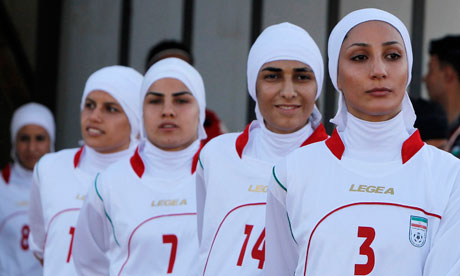
http://rabble.ca/babble/national-news/muslim-girl-ejected-tournament?page=2
http://www.theborneopost.com/2012/12/13/arifah-eyes-gold-sweep13-year-old-hopes-to-win-all-eight-events-at-state-wushu-meet/
http://breakingmuscle.com/womens-fitness/breaking-glass-hurdle-womens-firsts-2012-olympics
http://muslimwomeninsports.blogspot.com/2011_06_01_archive.html
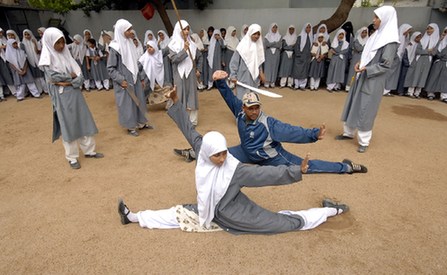
INDIA MUSLIM GIRL - GIRL KUNGFU SCHOOL
Wushu trainer Rahman Aqeel (C) instructs students during Chinese wushu martial arts practice at St. Maaz high school, in the southern Indian city of Hyderabad July 8, 2008. Girls from ages 10 to 16 participate in weekly sessions during school term. (Photo:chinadaily.com.cn/Agencies)
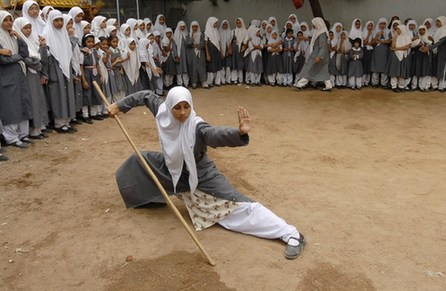
A Muslim schoolgirl from St. Maaz high school practises Chinese wushu martial arts inside the school compound in the southern Indian city of Hyderabad July 8, 2008.
http://www.china.org.cn/sports/news/2008-07/10/content_15987444.htm
MUSLIM SPOR GIRL AND FIFA
http://rabble.ca/babble/national-news/muslim-girl-ejected-tournament?page=2
Apparently, FIFA already had a review of on field religious declarations on the agenda for their meeting. This may have muddied the waters.
From globalgame.com here is a picture of the player involved
http://true-north-strong-and-free.blogspot.com/2007/04/five-muslim-girls.html

Mansour with members of Nepean Hotspurs Select. (Ottawa Citizen)
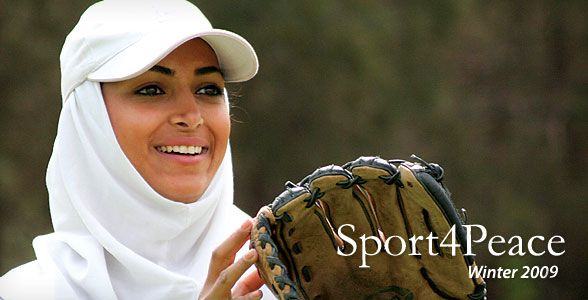
Sarah Hillyer may be one of the few Americans Maryam will ever meet. There’s a good chance Maryam will tell her friends and family in Isfahan, Iran, about Hillyer and how she came to Iran to coach Maryam’s fledgling softball team and gave them new balls and bats. And maybe the story of one American’s goodwill will spread to create a positive impression in the minds of other Iranians. This kind of hope is at the heart of Sport 4 Peace, an organization founded by Hillyer and fellow UT Knoxville student Ashleigh Huffman.
Sport 4 Peace provides sports camps and programs that use sport as a tool to promote peace and empower girls and women in countries where they may face cultural, political, and religious obstacles. Through the programs, Hillyer and Huffman gather data for their research in sport sociology. Hillyer has been to Iran eight times to teach softball to college-aged women. Many there had never heard of softball or seen a bat and glove. Since 2002 teams have sprung up in 15 cities around the country. During her last visit in May, Hillyer met Maryam, who is the catcher for the team in Isfahan.
Before Hillyer left, she presented the entire Isfahan team with two large duffle bags of equipment—a big improvement from the 1970s–era baseball bats and bases cut from scraps of carpet that they had been using. Hillyer says Maryam was overcome with emotion when she received a mask, a glove, and shin guards.
“In broken English she said, ‘It means so much. I am the catcher of the Isfahan team, and I’ve never had a mask or a chest protector or the things that go on our legs. And because of that I’ve had a broken nose and a few black eyes and several busted lips, and you have no idea how much this means to me.’ ”
As Maryam spoke, she began to cry, and then she hugged Hillyer.
“She sobbed as if she had lost someone to death because she was so incredibly grateful,” Hillyer said. “She finally had something to protect her face and body that would allow her to play a sport she absolutely loves.”
Together Hillyer and Huffman, both doctoral students at UT Knoxville, have worked in several countries in the Middle East, Asia, and North Africa. Government officials, National Olympic Committees, and other groups have invited Sport 4 Peace to their countries to promote sport. The Islamic Federation of Women’s Sports and the Baseball and Softball Federation invited Hillyer and other Americans to Iran.
Two years ago Huffman organized a girls’ camp in Israel that comprised Jews, Muslims, and Christians. Huffman interviewed 16 Israeli and Palestinian girls at the camp, and many agreed that the Sport 4 Peace experience had changed their worldview and encouraged them not to trust the prejudices inherent in their society. Today many of the girls remain friends despite their intense and sometimes hostile political environment.
Another lasting memory of the camp was the story of four girls solving a dilemma probably faced by other girls and women around the world—how to get dressed and ready for dinner in 15 minutes with only one available shower. They solved it by working together. Two Jewish girls, one Muslim, and a Christian put on their bathing suits and got in the shower together.
“You would never think that would happen, and so I think it was just the essence of the camp,” Huffman said. “And the fact that those four still remain in such close contact and have had their parents drive them to Jerusalem to meet—that’s what it was all about.”
Hillyer and Huffman believe sport provides a natural way for people to come together. Sport gives them the opportunity to communicate, set and achieve goals, learn to accept defeat, celebrate success, and work together.
“For these girls and women in cultures where they typically don’t have extensive sport opportunities and in cultures where they are often inundated with mistrust about other cultures and our culture, we think it’s made a tremendous difference in the lives of individuals,” Hillyer said.
Hillyer and Huffman are continuing their research, but they already have found sport to be a way to break down barriers and open dialogue between people who ultimately realize they’re not as different as they first believed.
“If those individuals can have a different idea and if they can just impact their family, then if their family can impact a wider range of community, then maybe in the end at least we’ve been able to impact small pockets of people,” Hillyer said. “In this pursuit of peace, anything is better than nothing.”

Football chiefs at the International Football Association Board have come to an agreement on Thursday to lift a ban on women wearin headscarves during games.This decision sends a green light to the participation of many muslim nations in competition.
Earlier, players were prevented from wearing a headscarf, or hijab, at the sport's highest level for safety reasons and on religious grounds.
However, many critics declared that this ban promotes inquality at the highest level for Football; one of the world's most popular sports. Public changes in the governing body's thinking were clear last year when it was decided that the hijab was a cultural rather than a religious symbol.
The world governing body came under pressure to lift the ban in 2007, after an 11-year-old girl in Canada was prevented from wearing a hijab for safety reasons.
Furthermore, in 2011, the Iranian team was disqualified after they refused to remove their headscarves merely moments before kick off in the 2012 Olympic ssecond round qualifying match against Jordan.
The decision caused outrage in Iran, with President Ahmadinejad accusing FIFA of acting like dictators and colonialists.
Alex Soosay, general secretary of the Asian Football Confederation (AFC), said AFC, based in the capital Kuala Lumpur of Muslim-majority Malaysia, would welcome a decision to lift the ban.
The hijab is worn by women beyond the age of puberty to observe Islamic rules on modesty and interaction of the sexes.
According to FIFA, more than 29 million women and girls around the world play the game.
To find out more about the Muslim Women’s Sport Foundation, please click here.
To find out more about the Snowdon Challenge, please click here.
Images courtesy of the Muslim Women's Sport Foundation.


The pioneering Muslim Women’s Sport Foundation (MWSF) celebrates its 10th anniversary this month. Ayesha Abdeen, the group’s Chief Executive, talks to Kick It Out about its achievements, ambitions and a planned trip to climb Mount Snowdon.
Founded in 2001 by Ahmed Versi, editor of the Muslim News, the Foundation enables Muslim women to participate in a variety of sports without compromising their Islamic values.
Based in London, the Foundation is run by a group of dedicated volunteers of diverse experience and backgrounds. With around 250 Muslim women directly accessing the sessions they hold, the Foundation has also managed to engage with over another 800 women across the country.
Ayesha said: “The sports which are most popular are futsal, basketball and badminton, which we directly provide to our members. I think basketball is well-liked because a lot of women were used to playing netball at school. We have a real mix of people though, who like a wide range of sports.”
Working closely with Kick It Out, the Football Foundation and The FA, the Foundation has a lot of support across the board. “We received £235,000 from the Football Foundation to fund our Born To Succeed project back in 2009. The money has allowed us to establish ourselves and to expand our focus.
“We always need more support though. If we had more funding we could employ more staff. We’re very understaffed at the moment, basically because the demand for sport from Muslim women is so high, which is of course a good thing.”
This Saturday (25 June), to celebrate the Foundation’s 10th anniversary, 45 women will be climbing Mount Snowdon, the highest mountain in England and Wales, intent on raising £1,000 for each year the organisation has been established.
“Everybody’s excited about the journey and looking forward to the challenge ahead. We’ve got people joining us who have just heard through word of mouth and want to show their support for the Foundation. They are all enthusiastic about the climb.”
Looking ahead, Ayesha revealed the Foundation’s ambition for the time they reach their 20th anniversary: “We’d like to have our own sport centre set up, creating a female-only environment which people are comfortable in. We also want to broaden the amount of different sports we are offering, giving the chance for as many people to get active and to encourage them to take advantage of the opportunities available to them.”
SAN FRANCISCO
California The women entered the brightly colored room with
sets of kickboxing equipment lined up on the side.
Some slowly took off their scarves, also known as a hijab
and jilbab, revealing their workout gear underneath
Muslim Women Slowly Breaking Sports Barrier

http://newamericamedia.org/2012/04/muslim-women-slowly-breaking-sports-barrier.php

California The women entered the brightly colored room with
sets of kickboxing equipment lined up on the side.
Some slowly took off their scarves, also known as a hijab
and jilbab, revealing their workout gear underneath
Muslim Women Slowly Breaking Sports Barrier

http://newamericamedia.org/2012/04/muslim-women-slowly-breaking-sports-barrier.php
Their fitness instructor, Phalestinah Abdo, welcomes them with the words, “Assalamu ‘alaykum” (Peace be with you).
Responding with the words, “Wa ‘alaykum salaam,” they began stretching their arms, starting their cardio kickboxing routine with two sharp jabs and a hook.
Although there is nothing in the Quran that forbids Muslim women from exercising, they are not allowed to exercise uncovered or have physical contact with men
However, there are many stories well known to Muslims about women going to battles.
During the Battle of Khaybar in 629, fought between Muhammad and his followers against the Jews living in Khaybar, 20 Muslim women went along with
Muhammad and his followers. “If these women from the past were warriors, then they were probably jumping or riding a horse,” said Jittaun Jones, a Muslim fitness instructor.
Western perceptions of Muslim women often revolve around images of passive figures shadowed by both men and the robes that enshroud them.
I find it interesting that other religions - despite their histories of oppressing women - are not seen in the same light as Islam,” said Yuka Nakamura, a York
University assistant professor who studied Muslim women’s participation in sports. “Perhaps this is because the image of the Muslim woman has become so emblematic, and the image of the veiled Muslim woman is so vivid
http://muslimvillage.com/2010/11/26/7443/muslim-female-athletes-shine-at-asian-games/
http://muslimvillage.com/2012/02/14/19601/hijab-no-barrier-for-muslim-athletes-to-excel/
http://muslimvillage.com/2012/05/24/23354/hijab-make-history-london-olympics/
http://muslimvillage.com/2012/01/05/17921/french-women-groups-oppose-fifa-decision-to-allow-hijab/
http://gulfnews.com/sport/other-sports/emirati-girl-makes-history-1.1010480
http://www.theborneopost.com/2013/06/11/fatehah-curi-tumpuan-peminat-sukan-berbasikal/
http://www.thefa.com/News/governance/equality/2012/may/muslim-womens-sports-foundation-award.aspx
http://www.friniggi.com/article_readmore.php?article_id=QK45G273VC
http://www.friniggi.com/article_readmore.php?article_id=C6868V45YE
http://moslemwomensport.blogspot.com/
http://true-north-strong-and-free.blogspot.com/2007/04/five-muslim-girls.html
http://newamericamedia.org/2012/04/muslim-women-slowly-breaking-sports-barrier.php
http://www.kickitout.org/1331.php
http://muslimwomeninsports.blogspot.ru/
http://www.albawaba.com/editorchoice/fifa-muslim-veil-433011
http://alumnus.tennessee.edu/2008/12/sport-4-peace/
November 26 2010
http://muslimvillage.com/2010/11/26/7443/muslim-female-athletes-shine-at-asian-games/
Back home, the Pakistani women’s cricket team is anonymous, especially compared with their illustrious male counterparts.
But after their gold medal triumph at the Asian Games, the girls in green were basking in the spotlight for a change. It was Pakistan’s first Asian Games gold medal in eight years – a milestone that supporters say points to the need for more education and opportunities in sports for women in Muslim countries.
“Our media doesn’t give women’s sports that much coverage, as much as they give to men’s sports,” said Pakistan all-rounder Nida Rashid. “There are so many sports in which women participate in Pakistan, like squash, table tennis and volleyball, but they go unnoticed.”
The Asian Games, an Olympic-style event drawing athletes from a collection of countries representing two-thirds of the world’s population, is the biggest stage for many of the female competitors.
In parts of the continent, playing sports is often considered inappropriate for women and out of step with traditional gender roles. Consequently, resources for coaching, training and competition generally lag behind the funding set aside for male athletes.
Pakistan came to Guangzhou with 25 female athletes out of a total of 169, participating in cricket, judo, shooting, squash and sailing.
Iran sent a women’s team to compete in kabaddi, and all wore head coverings in their opening match: a 62-18 win over Taiwan on Monday.
War-torn Afghanistan has seven women in its 67-member delegation, all of them competing in martial arts events. Conservative Saudi Arabia has 170 men and not a single woman.
In comparison, host China, a sporting powerhouse that has invested heavily in developing elite athletes of both genders, has 458 women and 507 men.
“There still needs to be more work toward educating females, educating their families to make them feel that is it OK to represent their countries abroad,” said Basma Ahmad Essa, a taekwondo athlete from the United Arab Emirates. “We’re not disagreeing with any laws of Islam or things like that, that a lot of conservative people might put as obstacles in front of players.”
Essa, 26, added that a lack of awareness about female participation in sports was also hampering development.
“We’ve started looking at the West and trying to get the best out of them, and trying to apply it within our countries, she said, sweat pouring off her face after beating a Nepali opponent.
One pioneering women’s squad has been taking the field in Guangzhou with traditional Muslim head coverings, showing that religious obligations can co-exist with sports.
“The world has developed and it is time for women to take their place,” said Maryam Ahmed Al-Suweidi of the Qatari handball team, just one of two female Arab teams in Guangzhou. The other is the football team from Jordan.
Olympic Council of Asia president Sheikh Ahmad Al-Fahad Al-Sabah, a Kuwaiti, said 80 per cent of the west Asian national Olympic committees had females participating in Guangzhou.
“For many of these athletes, it’s the first time in this environment,” he said, predicting that the number of female athletes from conservative countries would continue to swell. “This will continue to improve.”
The handballers are young and their inexperience has shown during lopsided losses to Taiwan and Kazakhstan, but Al-Suweidi says it’s just the beginning, noting that participation in women’s sports has been on the rise in her home region.
“Of course all people like to take part in sports … I do not believe there is any obstacle at the moment against women taking part in sport in the Arab world,” she said confidently.
Pakistan cricket captain Sana Mir noted that her squad used to just compete against women’s teams but now also play men’s Under-19 and Under-25 sides.
“I think if women in Pakistan are given opportunities to play sports with proper coaches and facilities, there’s no reason why they should not perform – not only at Asian Games – but also in major international tournaments,” she said. “I believe if you do something with honesty you can gain a lot in the field of sports.”
http://muslimvillage.com/2010/11/26/7443/muslim-female-athletes-shine-at-asian-games/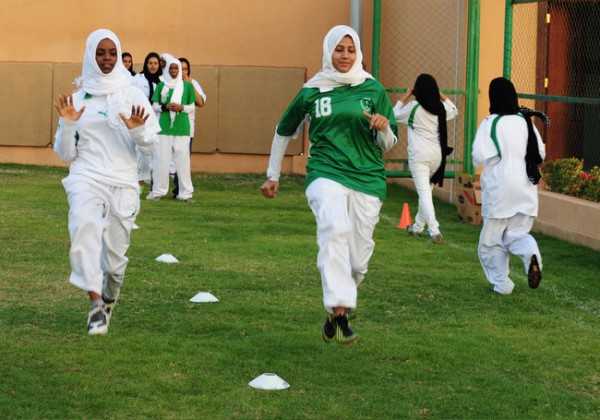
Becoming the first team to compete in an international competition in hijab, female Muslim weightlifters from the United Arab Emirates will be making history in the London Olympics.
http://muslimvillage.com/2012/05/24/23354/hijab-make-history-london-olympics/
“We were the first country for our athletes to be covered, wearing Islamic dress,” Jassim Abdulrahman Al-Awazi, a board member for the Emirates Weightlifting Federation and the GCC Weightlifting Organization, told the Emirati daily The National on Monday, May 21.
UAE weightlifters have earned a place in the London Olympics, to start in the British capital from July 27 to August 12.
This time, the weightlifters will be able to don hijab while participating in the competition after the International Weightlifting Federation (IWF) changed rules to allow the Muslim headscarf.
It followed the case of veiled US Muslim athlete who challenged IWF rules that banned the outfit in competition.
Under previous IWF rules, weightlifters wore outfits, officially called “costumes”, which had to be collarless and not cover the elbows or knees.
But in July, the governing body modified the rules to accommodate Muslim beliefs and accordingly allowed hijab.
“It is very good for Muslim countries that this issue has been raised,” said Al-Awazi.
“It is not forced, it is a choice for the athletes if they want to wear it.”
Islam sees hijab as an obligatory code of dress, not a religious symbol displaying one’s affiliations.
New Audience
UAE officials believe that amended rules to allow hijab will open the sport to a whole new audience.
“Now it has been opened to everyone,” Al-Awazi, the board member for the Emirates Weightlifting Federation, told The National.
“If you want to join, why not? Now there are no excuses, no reasons to say no.”
Sheikh Sultan bin Mejren, the president of the Emirates Weightlifting Federation, shares a similar view.
“It was a decision which will help the whole Islamic world,” Mejren said.
“Now there is no difference between Muslims and non-Muslims in events like the Olympics. There is no border to accept them or not.
“Everybody can participate without breaking rules.”
Physical Olympic sports such as rugby and taekwondo allow Muslim women to wear the headscarf in competition.
Hijab shined during Beijing Olympic Games in 2008 when many Muslim women athletes broke Western stereotypes, proving that donning hijab is not an obstacle to excelling in life and sports.
During the games, half a dozen veiled Egyptians, three Iranians, an Afghan and a Yemeni competed in sprinting, rowing, taekwondo and archery.
http://muslimvillage.com/2012/05/24/23354/hijab-make-history-london-olympics/

- Image Credit: AFP
- Emirati junior figure skater Zahra Lari performs during the figure skating European Cup on April 12, 2012 in Canazei, northern Italy.
More than 50 countries took part in the European Cup but Zahra's participation was understandably the talk of the town.
"It was an amazing experience. The people were really nice and I made many friends among the participants," she told XPRESS in an exclusive interview on her return to Abu Dhabi.
"Nobody asked me anything about why I wore the scarf around my head while performing. I was obviously a bit nervous when I reached there, but once I started performing things were fine. My coach Noemi Bedo told me to skate without a care and I think I really did the best I could under the circumstances," added the Abu Dhabi Figure Skating Team member, who is sponsored by the Abu Dhabi Sports Council and Zayed Sports City.
Article continues below
http://gulfnews.com/sport/other-sports/emirati-girl-makes-history-1.1010480
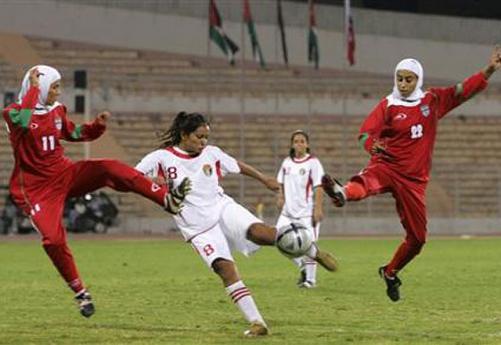
Three French women’s organizations have expressed concern and disappointment with world soccer body FIFA’s endorsement of a proposal to lift the ban on women players wearing a hijab, an Islamic hair dress, on the pitch.
http://muslimvillage.com/2012/01/05/17921/french-women-groups-oppose-fifa-decision-to-allow-hijab/



